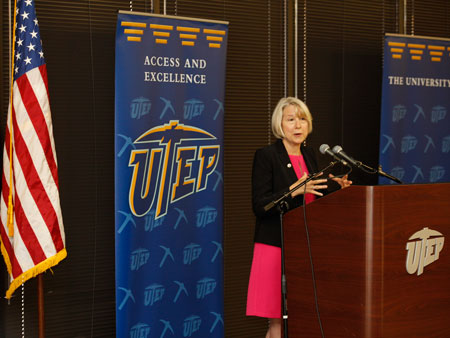Originally published April 18, 2016
By Daniel Perez
UTEP Communications
The leader of the U.S. Peace Corps visited The University of Texas at El Paso on April 13 to celebrate UTEP’s success at producing the kind of skilled individuals needed to improve the world through peace, education and mutual understanding.
U.S. Peace Corps Director Carrie Hessler-Radelet announced that UTEP is ranked #12 in the country among Hispanic-Serving Institutions for producing volunteers who serve in the Peace Corps. Eight UTEP graduates are currently serving as Peace Corps volunteers around the world.

This ranking is the University’s latest recognition for service to the community and beyond. UTEP has been ranked among the Top 10 universities in the nation by Washington Monthly since 2013 in part because of a dedication to community service by its students, faculty and staff. UTEP has received similar accolades from the Carnegie Foundation for the Advancement of Teaching and the President’s Higher Education Community Service Honor Roll.
Hessler-Radelet, a fourth-generation Returned Peace Corps Volunteer (RPCV), enthusiastically thanked the University for its partnership with the organization that was created to improve the world. She also noted UTEP’s role in the history of her organization. UTEP, then called Texas Western College, graduated the nation’s first Peace Corps cohort of volunteers in the summer of 1961.
“We expect to see UTEP rising in the ranking in years to come,” said the director, who lauded UTEP’s diverse student population and cross-cultural experiences as strengths. She mentioned her goal of creating a more multicultural volunteer force of the best and the brightest to better represent America.
University President Diana Natalicio said members of the campus community were “deeply honored” to be recognized by the Peace Corps.
“This is an important milestone for us,” said President Natalicio, who in 1966 served as a training specialist and Portuguese language coordinator for Brazil’s first in-country Peace Corps training program.
The University leader said the missions of both institutions were well aligned and the partnership expands the range of opportunities for UTEP graduates who understand and take pride in their responsibility to reach out and help transform lives.
President Natalicio also spoke with pride about UTEP being one of 50 institutions of higher education nationwide that offers a Peace Corps Prep program for undergraduates to learn skills that will enhance their chances to become Peace Corps volunteers and their abilities to work at an international level.
The UTEP program launched two years ago and today offers almost 200 courses that span the University’s colleges and fit into the four core competencies: foreign language skills, intercultural awareness, training and experience in a specific work sector, and professional and leadership development. Participants need to take at least seven courses and complete 50 volunteer hours that involve leadership experience. The Peace Corps expects to recognize this summer the first UTEP student to earn a Peace Corps Prep certificate.
Donna Ekal, Ph.D., associate provost for undergraduate studies, said she makes presentations about the Peace Corps Prep program that explain how the classes are beneficial whether or not the students apply to the Peace Corps. Ekal, a RPCV, served from 1983-85 as an agronomist in Thailand.
She said the concept of the Peace Corps continues to resonate among students interested in an opportunity for adventure and to make the world a better place. She said many UTEP students are uniquely qualified to be successful Peace Corps volunteers because of their assets and skills such as being bilingual and bicultural, and their deep appreciation of the value of education that will impact them and their families for generations.
“We hope the director’s recent visit raised the profile of Peace Corps on campus and that students are interested in Peace Corps as an opportunity,” said Ekal, who participated in a panel discussion that touched on the benefits and challenges of being a Peace Corps volunteer.
The Peace Corps also classified UTEP as a strategically important institution and approved an approximately $125,000, five-year grant that would allow the University to hire a RPCV graduate student as a dedicated Peace Corps recruiter, and an undergraduate student to help on campus with Peace Corps services. UTEP is the second institution in Texas and the seventh in the southwest to earn these funds.
According to the Peace Corps Fast Facts web page, current volunteers serve in 63 countries around the world, with the majority in Africa. Most volunteers are female (63 percent), single (95 percent) and their average age is 28. Most work in the education field (37 percent). Volunteers serve about 27 months.
Javier Apodaca, a senior microbiology major, was among the students who attended the April 13 event. The El Paso native said he started the Peace Corps application process in March 2016. His desire to serve started during the summer of 2015 when he spent two weeks as a volunteer at a medical clinic in Guatemala.
“UTEP prepared me to move forward with a can-do attitude,” said Apodaca, who expects to graduate in December 2016. He would like to serve in Albania to help where needed. “I need to do something bigger.”
For more information about the Peace Corps and the Peace Corps at UTEP, click here.